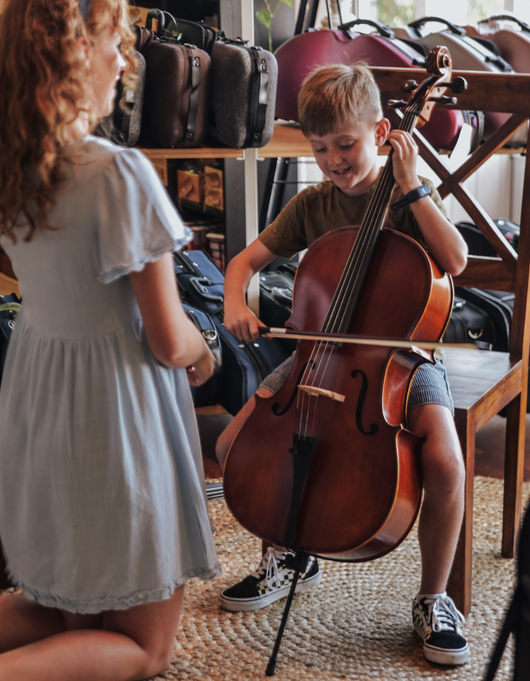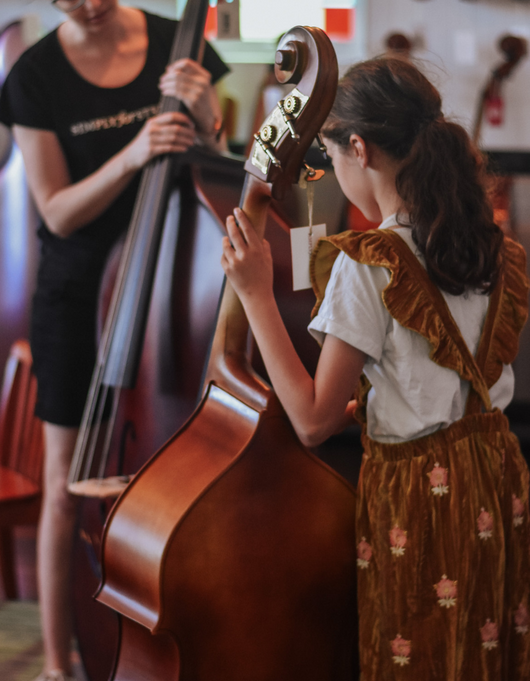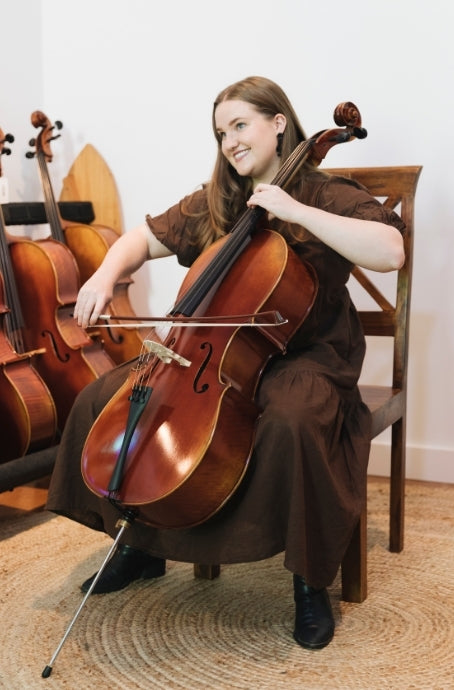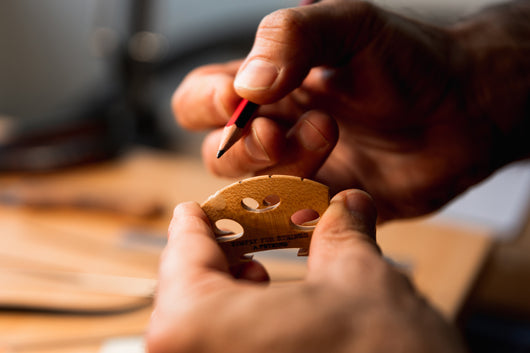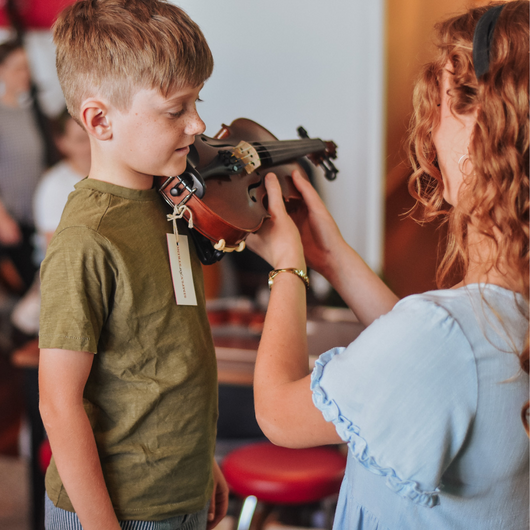Accessories
String Instrument Accessories: Violin, Viola, Cello & Double Bass
Complete Your Musical Set with String Instrument Accessories
A string instrument is your musical voice, allowing you to communicate emotion, passion, and artistry. But to bring out the best in your violin, viola, cello, or double bass, you need high-quality accessories. They are essential to enhancing your performance, ensuring comfort and precision while playing, and caring for your instrument.
At Simply for Strings, we offer a carefully curated collection of premium music instrument accessories designed to meet the needs of musicians at every level. We've got everything you need from renowned brands like Pirastro, Melos, Kun, Wolf, Everest, Manhasset, DCM, and Korg to enhance your musical journey.
Top-Quality Instrument Accessories for String Musicians
Instrument accessories may seem like small details, but they play a major role in your comfort, sound quality, and overall playing experience. The right accessories can help protect your instrument, ensure accurate tuning, improve your technique, and inspire confidence. From shoulder rests that provide support during long practice sessions to metronomes that keep your timing impeccable, string instrument accessories are indispensable tools for any serious musician.
At our Brisbane music store, we supply a wide range of accessories for violinists, violists, cellists, and double bassists:
- Shoulder Rests: A good shoulder rest is a game-changer for violin and viola players. It provides stability and comfort and reduces strain on the neck and shoulders during long practice sessions. Brands like Kun, Wolf, Everest, and Bonmusica offer a range of shoulder rests designed in different shapes and sizes. There's no one-size-fits-all solution, so it's important you take the time to choose a shoulder rest that perfectly suits your personal comfort preferences.
- Rosins: Rosin is an essential musical instrument accessory for all string players. It helps create the necessary friction between your bow and the strings. Choosing the right rosin can enhance your tone, improve bow control, and bring out the full potential of your instrument.
- Mutes: This small accessory alters the sound of your instrument, softening its volume and adding a distinct tonal quality. Whether you're rehearsing late at night or performing a piece that requires a more subdued sound, mutes are a valuable tool.
- Music Stands: A sturdy music stand is essential for any musician, ensuring that your sheet music is always at the right height and angle. At Simply for Strings, Manhasset and DCM offer high-quality, durable music stands that are easy to adjust and transport, perfect for practice and performance.
- Rock Stops: For cellists and bassists, a rock stop is a must-have music instrument accessory that keeps your endpin from slipping on the floor during the performance. It provides stability, allowing you to focus on your playing without worrying about your instrument moving out of place.
- Bow Hold Grips: For younger players or those looking to improve their bow technique, a bow hold grip is a useful and effective tool. They help guide your fingers into the correct position on the bow, encouraging better technique and more comfortable playing.
- Tuners and Metronomes: Accurate tuning and timing are critical for every musician. At Simply for Strings, we carry traditional and digital tuners and metronomes from trusted brands like Korg and Wittner, ensuring that your instrument is always in tune and your practice sessions are perfectly timed. Whether you prefer a standalone metronome or a combination with a tuner, we've got you covered.
Choosing the Right String Instrument Accessories
When it comes to selecting the right musical instrument accessories, consider your personal needs and playing style. Are you a violinist who spends long hours practising? A viola player looking to improve bow control? Or a cellist who needs extra stability during performances? Each accessory should complement your instrument and enhance your playing experience.
At Simply for Strings, we're here to help you make the right choice. Our experienced staff are all passionate musicians, so we understand the specific needs of string players and are dedicated to nurturing a love of music in our string-playing community, no matter your playing ability. Whether you're looking for a new shoulder rest, rosin, or metronome, we can guide you through our collection and help you find the best string instrument accessories.
Buy Your Instrument Accessories at Simply for Strings
At Simply for Strings, we are committed to providing musicians with the highest quality products. All of our accessories and instruments are 100% authentic and come from trusted brands known for their quality, durability, and performance. We take pride in our curated selection of musical instrument accessories, ensuring that every item we stock meets and exceeds your expectations. As musicians ourselves, we delight in sharing our firsthand experiences and personal recommendations when it comes to choosing the right accessories for you. You can trust that every accessory purchase from Simply for Strings will be of the highest quality.
Explore our collection today and discover the premium-quality instrument accessories to enhance your sound, improve your technique, or protect your instrument for many years of quality, enjoyable playing.
What should I use to clean my instrument?
We recommend regularly wiping the instrument with a microfibre cloth. This will help prevent rosin build-up on the violin and the strings. Wiping the strings where you place your fingers will also help to prevent the oils in your hands from causing the strings to deteriorate faster. We also have a variety of cleaning products for different purposes. The varnish on orchestral string can be very easily damaged by using the wrong product whereas ebony is much more durable but quite porous. Products that can be used on ebony would damage varnish and products that can be used on varnish would soak into the ebony, so different products are designed for different areas of the instrument, for example polish made specifically for the ebony parts of an instrument. We generally recommend seeking advice for what to use from a professional or leaving big cleaning efforts to a trained luthier to prevent causing further damage to your instrument. Regularly wiping with the cloth will hopefully keep your instrument in a state where you won't need to use the cleaning products.
Does the shoulder rest need to be sized up to the player?
Each shoulder rest product is designed to match a specific size of instrument. This ensures a snug proper fit to prevent the shoulder rest falling off too easily or damaging the ribs of the violin from being too tight. We do not need to match the size of the shoulder rest to the specific player as long as you know the size of the instrument. We do recommend bringing your instrument in with you when buying a shoulder rest as there is a variety of differently shaped shoulder rests that will provide different levels of support and comfort depending on your playing style and your body.
What is the difference between a practice mute and an orchestral mute
Practice and orchestral mutes are used for very different purposes. Practice mutes are an accessory usually rubber or metal that fits over the bridge and are solely, as the name suggests, used for practicing in situations where you are not able to play at full volume. There are a variety of different types of practice mutes but all will vastly dampen the sound of your instrument. Orchestral mutes on the other hand are much smaller and will generally clip onto the strings between the bridge and the tailpiece and can then be clipped on and off the bridge very quickly. These mutes will effect the volume of a violin much less and are used during certain orchestral pieces as an effect.
What is the best option for marking fingerings on a fingerboard?
There are a lot of different methods used by teachers to mark finger positions on fingerboards. Most teachers use stickers which is generally fine but can cause some issues after a while. normal stickers are prone to peeling up from the amount of contact when a child is playing, this can cause buzzing and other issues. They also generally leave a large amount of sticky residue on the fingerboard which can be uncomfortable for the player and difficult to remove. We strongly recommend avoiding using things such as whiteout for marking the fingerboard as it is extremely difficult to remove without actually shaving down the fingerboard. There are products such as fingerboard tape and the "First Fret/Don't Fret" stickers that are specifically designed for use on a fingerboard. They will last much longer than any other option, will not peel up as easily and will not leave much sticky residue behind.
Why is there a big price difference between different rosins?
Generally, as you pay more for a rosin, the grain of the powder from the rosin will be much finer. This means that more expensive rosins will be less scratchy and have a smoother sound. Some rosins also have special additives to them that will effect the sound such as the Larica Gold rosin has gold particles in the rosin, while others are designed to work better with certain sets of strings such as Pirastro's line of rosins. One of our most popular professional level rosins, the Leatherwood rosin is a bespoke rosin handmade in Australia. This rosin is specifically designed to work best with Australia's climate and humidity whereas most other rosins were designed with European or American climates in mind.
What is the difference between the different bow grips?
There are two different kinds of accessories that will go on a bow. There are bow grips such as the Stringvision bow grip which are designed to make holding a bow more comfortable by adding padding in the case of foam bow grips or add more grip in the case of rubber bow grips. The other category is bow hold correctors or learning aides. These products, for example the Bow Hold Buddies, are designed for students and players learning to hold a bow correctly. They are designed with shaping the hand in a particular way or making sure that the pinky finger or thumb are in the correct position.
How do I know which music stand to get?
There are a few factors to consider when choosing a music stand; portability, durability, and height. The biggest factor is portability, will this stand be set up in a room at home and not move? or does it need to transported to and from school or gigs? We have a variety of different folding stands by Onstage that come with bags for easy transport. But, this ties in to durability, if the stand is just going to be in one place, we have a variety of stands such as the Manhasset stand which does not fold up but is much sturdier and has a solid back plate. Finally in terms of height, will you be playing standing or sitting? For some people, they will find that when playing while standing that some stands at their maximum height will be still too short for them to see easily without effecting their posture. This can cause neck and shoulder issues over prolonged periods of time. Manhasset stands will extend taller than most other stands and are generally used as the standard stand by most schools and orchestras.
What is a wolf note eliminator?
A wolf note/tone is caused when the pitch of a note being played is close to the natural resonant frequency of the body of an instrument. This causes a wobbling or beating effect in the note. Wolf notes are usually only noticed in bowed instruments and is frequent problem for mostly cellos. A wolf note is most frequently on or between E and F# for cello or G# for a double bass. A wolf note can never truly be gotten rid of, instead we use what is called a wolf note eliminator. A wolf note eliminator is a metal tube with a mounting screw and an interior rubber sleeve. This fits onto the string between the bridge and the tail piece to weight the string. The eliminator will need to be placed differently on the string depending on what note the wolf note is sounding. This weighting of the string will reduce the effect of the wolf note or influences the placement of the wolf note to be in between two semitones, essentially moving the wolf note in between where a player would play
What is a Rondofile?
Rondofile is an Australian company who have created a unique display folder initially designed for music teachers and students. The three tabs on the sides of the pages will securely hold your music while leaving the majority of the paper exposed allowing annotation or correction to be quicker and easier for musicians and instrumentalists.
What are the essential accessories needed for playing a string instrument?
Most of our instruments are sold as an outfit, which means that included with the instrument is a case and a bow. Also necessary for playing is rosin for all instruments as well as a shoulder rest for violin and viola players, or a rockstop/slipstop for cello and double bass players. We very strongly recommend a cleaning cloth to clean any rosin off your instrument after playing, and a music stand as you will need somewhere to put your music! We also believe that when buying an instrument, it is in your best interests to have a professional assist with selecting a shoulder rest and chin rest. In our experience, we have found that the basic chin rest and standard shoulder rest combination does not work for very many people. Playing with the wrong chin rest and shoulder rest combination can cause a large amount of discomfort and deter especially children from wanting to practice or continue playing. Over a long period of time, and incorrect set-up can cause irreparable damage to your neck and shoulder with some players even requiring full shoulder reconstructions. As such we are very strong advocates for ensuring everyone has the correct set up for them from the beginning.





